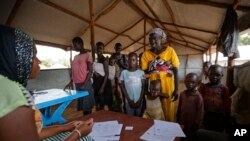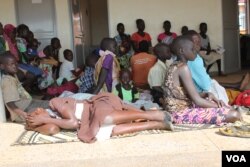The nearly 1 million South Sudanese refugees in Uganda face shortages of food, water and medical care, but they have also brought with them the trauma of the war they fled. Aid agencies are struggling to meet the need for counseling for survivors of gender-based violence.
She was attacked in South Sudan six months ago, but she is still afraid to answer the door. VOA met this 35-year-old woman at the Pagirinya refugee settlement in Uganda. She spoke through a translator.
She said she doesn't know if it was government soldiers or rebels. She says there were four of them who walked into her house and one of them started raping her. The other three stood guard. After that, she says, they asked her for money. They started looking around and took 500 South Sudanese pounds and left.
She said when her husband came home, she told him what had happened. He told her to leave or he would kill her. She arrived in Uganda in February.
Insufficient trauma counseling
U.N. human rights officials said earlier this year that rape had reached “epic proportions” in the conflict in South Sudan. The impact is felt in the refugee settlements, though U.N. officials say funding for trauma counseling is insufficient.
“We have about 20,000 women that have visited our center," said Alain Sibenaler, the Uganda Country Representative for the UNFPA. "Those are women that report abuse, that talk about, and that’s of course very difficult to estimate how many more there are who have been silent, but it’s important to know that, before they cross the border, there is already a large amount of violence that they have been subjected to. Now, that violence sometimes continues on their way to the settlement or is even perpetrated within the settlement.”
VOA spoke to a community facilitator working with abused women in the settlements. He said he sees food shortages intensifying domestic violence.
Domestic violence
One 30-year-old refugee from East Equatoria told VOA about the abuse she faces. She has seven children, two of them from her previous marriage. She said her husband beats her when he sees her feeding them from the family’s rations.
She says “he used a bamboo stick to beat me. He hit my hand and broke my wrist. He also hit my back, I am always in pain." She says the day I returned from the hospital, he raped me and while at it he said 'I want to see who will come and rescue you. You are my wife.'"
She says she threatened once to report him to Ugandan police, but he told her he would cross back into South Sudan to evade capture.
Uganda’s government says it is aware of the problem of violence against women in the settlements.
“When they struggle for resources in the areas that we give them, say, like water points, they become susceptible to all sorts of abuses," said Minister for Refugees Musa Ecweru. "I have had to go sometime as a minister responsible to speak very strongly to refugees, that some of you may have run from countries where law enforcement was weak, you have now run to a country where we take rights of others very strongly.”
However, the minister said there have not been any recent arrests or prosecutions related to gender-based violence in the settlements. He said the government has placed priority on counseling survivors of abuse.







